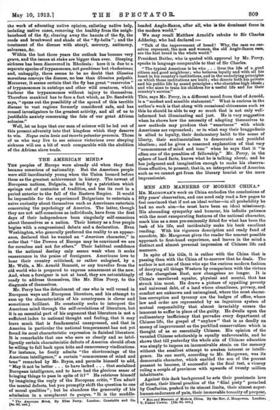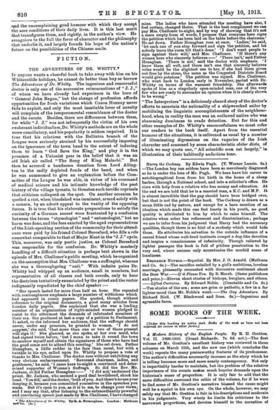MEN AND MANNERS OF MODERN CHINA.* Ma. MACGOWAN'S work on
China embodies the conclusions of fifty years' observation, and one need only read a few pages to feel convinced that if not an ideal writer—in all probability ho had no such aim—be must have been an ideal missionary. His abounding sympathy and humour, his infinite patience with the most exasperating features of the national character, mark him as a man pre-eminently fitted for what has been the task of his life, and incidentally make his book excellent reading. With his vigorous description and ready fund of anecdote, Mr. Macgowan gives the reader the nearest possible approach to first-hand experience, and leaves in the mind a distinct and almost personal impression of Chinese life and manners.
In spite of his title, it is rather with the China that is passing than with the China of to-morrow that he deals. The author is not one of those who ape the curious modern fashion of decrying all things Western by comparison with the virtues of the changeless East, now changeless no longer. It is China's unrelieved squalor, physical and mental, that has struck him most. He draws a picture of appalling poverty and universal debt, of a land where cleanliness, privacy, and comfort are unknown and unimagined, where the most shame- less corruption and tyranny are the badges of office, where law and order are represented by an ingenious system of mutual responsibility that almost invariably causes the innocent to suffer in place of the guilty. He dwells upon the rudimentary inefficiency that pervades every department of Chinese life, the gospel of " anyhow" that is as deadly an enemy of improvement as the purblind conservatism which is thought of as so essentially Chinese. His opinion of the vaunted Chinese scholarship is equally unfavourable, and he shows that till yesterday the whole aim of Chinese education was simply to impose an inconceivable strain on the memory without the smallest attempt to awaken interest or intelli- gence. Its one merit, according to Mr. Macgowan, was its democratic character, which enabled the son of the poorest peasant to become, if successful in the final test, a viceroy ruling a couple of provinces with upwards of twenty million inhabitants.
Against this dark background he sets their passionate love of home, their literal practice of the " filial piety " preached by Confucius, pushed to its utmost limits, their almost super- human endurance of pain, their immovable tenacity of purpose,
• Men and Manners of Modern China. By the Nov. J. Macgowan. Loudon; T. Fisher tinwin. 61. net.]
and the uncomplaining good humour with which they accept the sore conditions of their daily lives. It is this last merit that transfigures them, and rightly, in the author's view. He recognizes to the full the force of character and the philosophy that underlie it, and largely founds his hope of the nation's future on the possibilities of the Chinese smile.











































 Previous page
Previous page